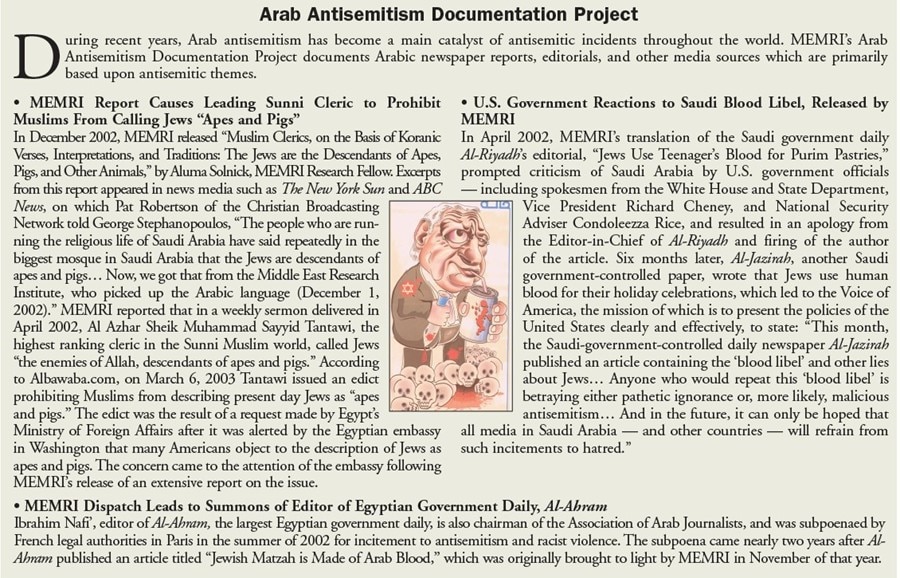In the latest entry in an ongoing series celebrating MEMRI's 25th anniversary, MEMRI's President Yigal Carmon and Vice President Alberto M. Fernandez delve into both MEMRI's video archives and into contemporary social media to see how the institute produced both research and impactful public-facing content that created a distinctive brand and even, a host of imitators.
Research institutes are rightly judged by a variety of criteria, the uniqueness of the research, the quality of the writing, the comprehensiveness of the sources used, are all some of the important factors that measure impact. Research and scholarship can illuminate obscure topics and shed light on larger trends. For MEMRI, the goal was always to bridge the language gap and expose the breadth of discourse, parts of it very ugly but others inspiring and uplifting, such as the often-lonely fight of reformers, occurring in foreign languages on a variety of topics of interest to us and our audiences in the West.

Some of the work done by MEMRI through the years has been low profile, carried out in consultation with law enforcement and other government agencies, on issues such as actual terrorism threats and hate speech or on technical matters such as social media platforms or cryptocurrency.[1] We are also proud to have worked with social media companies and academic institutions, providing our expertise on issues such as antisemitism and jihadist propaganda.[2]
But while all of the preceding effort of careful and detailed research has been very important, we also recognize that MEMRI is known also for visual, usually video, content that can be viscerally understood as a kind of a small slice of truth that perhaps illuminates a larger truth. These videos have in a way served as a type of "condensation symbol" featuring language or images that communicate an intense emotional power and immediate meaning to an audience.[3]
In March 2022, MEMRI released a translation of a Palestinian wedding singer video clip that garnered several million views.[4] The attraction was that this particular wedding singer was praising Russian President Putin's recent invasion of Ukraine, calling on China to do the same to Taiwan "so that we will smash the nose of the Americans." The truth here was not so much that some Palestinians were praising Russia, that is the least of it. The larger point was that the Western discourse about the Ukraine War was not shared by many in the world who had their own issues and experiences with what they saw as Western hypocrisy and Western interference in their own affairs.
A year later into that bloody Russian invasion and we see that this reality has endured. The Russians are opposed by an alliance which is largely those countries most closely allied to the United States, with much of what is called the developing world either ambivalent or passive about this war.[5] Reaction to the video could be amusement or disgust but the truth revealed by the content – the Western discourse on this war is largely Western and remains so – was prescient.
This sort of public-facing content perhaps sets MEMRI apart from other research institutes working on the Middle East. The result is not so much advocacy but rather the use of open-source information that often explains or promotes broad policy goals – not of a specific government in office but of broader themes, including cherished Western values and liberal traditions that we all too often pay lip service to but increasingly ignore.
Even in the early years, this type of public impact was there. A 2002 MEMRI report on a plague of antisemitic utterances by Islamic clerics was picked up by major media outlets in the United States.[6] And similar reports on blatant antisemitic content in government-controlled Arabic-language media in Egypt and Saudi Arabia led to actual action on the ground in those countries in response to direct, high-level contact by the Bush Administration with those Arab governments. MEMRI's 2002 translation of an openly antisemitic blood libel article by senior Egyptian media executive Ibrahim Nafi' (also at the time chairman of the Association of Arab Journalists) would lead to his prosecution in France for "incitement to antisemitism and racist violence," which are crimes under French law.[7]

Other content that went viral in past years, reaching millions of views, highlighted the voices of actual individuals in the region fighting their own battles in their own societies. One such example was Syrian-American psychiatrist and secularist Wafa Sultan appearing in 2006 on Al-Jazeera Television's notorious, popular Al-Itijah Al-Muakis debate show with Faisal Al-Qassem. Sultan's unabashed defense of the West received tremendous criticism from the region and from leftists and Islamists in the West (comfortably hating the West while benefiting from it) but also sympathetic support from others.[8] Sultan sought to play down the discourse popular in the region and taken from the work of Samuel Huntington on the clash of civilizations, giving it her own spin.[9] The clash was not between civilizations but rather between "two opposites, between two eras. It is a clash between a mentality that belongs to the Middle Ages and another mentality that belongs to the 21st century."[10]
Still another viral clip with millions of views came in 2013 and featured 11-year-old Yemeni girl Nada Al-Ahdal who fled her home in order to escape a forced marriage.[11] Despite initial claims from the Yemeni media that Al-Ahdal was lying, the video, and the worldwide reaction to it, led to raised awareness and discussion on the scourge of child marriage in the Middle East.[12]
Another viral video, from 2015, showed Lebanese television host Rima Karaki cutting off London-based Egyptian jihadist Hani Al-Sibai after his insulting remarks.[13] The video seemed to touch a nerve because it showed a professional Arab woman journalist in control, not taking abuse from an extremist cleric. It was watched over two million times within a week.[14]
But while MEMRI video clip content often has a mass appeal, sometimes the impact is to be found not so much in numbers but in an "elite" response to that content. Such was the case in 2020, when then Iranian Foreign Minister Javad Zarif attacked MEMRI as having "sunk to a new low" for having quoted him accurately in having used a pejorative Farsi word about Jews during an interview he gave to Arman Media.[15] Iran is, of course, the world leader among governments in promoting Holocaust Denial but also "the world's chief trafficker in antisemitism," according to the US government's bipartisan international religious freedom commission (USCIRF).[16]
The cunning Zarif's anger seemed to be more about the damage done to his carefully cultivated aura of moderation in the West (he tweeted the attack on MEMRI in English) while serving "the world's most powerful antisemite" on social media, his boss Iranian Supreme Leader Khamenei.[17]
If you drill into some of the criticism that MEMRI has received through the years, the heart of the matter seems to be not so much that MEMRI has been false or inaccurate but that it has been inconveniently accurate, thereby piercing the comfortable whitewash with which some in the West have sought to paint the region. The content has been embarrassing to those who seem to see extremism only in the West and whose default political position is to tend to excuse radical discourse from non-Westerners, specifically from Muslims. Strangely enough, MEMRI's extensive content featuring the voices of Muslim liberals and reformers tends to – with the exception of some cases, such as Wafa Sultan cited above – get fewer views and reactions than the coverage of the extremists.
One of the ironies of today's interconnected world is that people in the region today see the same videos of crazed or extreme Westerners saying all sorts of things about themselves, the West, and the region. And this does not just apply to the strange social or culture war issues of the day breaking out in the West. The time when someone like Joe Biden could spin a certain hostile discourse about, say Saudi Arabia, for the sake of a liberal American audience and then use a different spin with the Saudis is now past. MEMRI does not go from English to Arabic but others do, and the region sees us in real time with all our follies, dysfunction, and hypocrisies fully exposed.
SUPPORT OUR WORK

Thousands of very real, serious "MEMRI TV" clips with well over a hundred million views and related articles through the years have even spawned a host of amateur imitators, either sympathetic or malicious, mostly seeking to amuse but sometimes trying to make their own points, one point being that people sometimes really do or say crazy, outrageous things that are hard to believe but are actually real.[18] There are even online meme generators to facilitate the process of making fake screen captures.[19] Still other times, real bits taken from MEMRI clips are used by these imitators as commentary on totally unrelated news items.

While we do not endorse nor condone the misuse of the MEMRI label and style, this is a type of backhanded flattery, showing that MEMRI's actual, real content has in a sense gone viral, and has penetrated to a certain extent into the media-savvy mindset of young, heavily online, users, an important demographic. Being copied is a significant measure of success as much as reaching tens of millions of views.
Sometimes the parody is all too close to reality. The "SpongeBob Jihad" meme below is an online parody, not actually real. But "Farfour" the Hamas Mickey Mouse rip-off seen preaching jihad to the children of Gaza was all too real. Farfour was "martyred" in the last episode of Al-Aqsa TV's series "Pioneers of Tomorrow" in 2007.[20] He was then replaced by "his cousin" Nahoul the Bee who also promoted the virtues of martyrdom and jihad.[21]

The Hamas bee would then also be martyred and replaced by Assoud, the Hamas bunny rabbit, who intends to continue in the path of Nahoul and Farfour and vows that "I, Assoud, will get rid of the Jews, Allah willing, and I will eat them up, Allah willing."[22] Hamas indoctrination of young children using such characters would seem ludicrous if the results were not so dire. These MEMRI clips also went viral and were picked up by Western media worldwide, including in French, German, and Spanish. Better still, this content and other clips – as documented by MEMRI – would directly lead to the banning of Hamas's Al-Aqsa TV in France and on the Eutelsat satellite in 2010.[23] MEMRI's coverage of Hezbollah's channel Al-Manar also led to steps by the French government, and extension, the European Union, authorities, to remove Al-Manar from European satellite channels. The head of Hezbollah's television channel Abdallah Qassir openly blamed MEMRI for the banning of both channels in Europe.[24]

All too often open-source intelligence is used to inform governments internally rather than being exploited in the public arena. Both uses are important and have a distinct role to play. Within government there is sometimes the tendency to regard highly classified, closely guarded content as more significant than open-source material. Leaving aside the problems of overclassification of documents in the United States, and the importance of protecting sources and methods, sometimes the truth is hiding in plain sight for all to see, if they have the eyes to see.
As for the public uses of open-source material, using your ideological or political adversary's words against them is common in the world of partisan politics, and in foreign affairs often more effective than anodyne statements by government spokesmen who have little credibility and have to carefully watch what they say. And when the material comes from outside the direct channels of governments themselves, this also helps in public acceptance of the credibility of the material. This reality is part of why MEMRI's content has been so compelling for so long and still retains its power, not so much because of the translation – although that is essential – but because of the origin, because it comes from the horse's mouth.
*Yigal Carmon is President of MEMRI and Alberto M. Fernandez is MEMRI's Vice President.
[1] See MEMRI Special Announcement No. 1222, MEMRI Releases 'The Eye Of The Storm: [Domestic] Terrorists, Neo-Nazis, And White Supremacists Using Cryptocurrency – Part II' – A Landmark Follow-Up Study On Neo-Nazis Using Cryptocurrency, As Jihadis Did Before Them, July 14, 2022.
[2] Morningstar.com/news/accesswire/737078msn/the-middle-east-media-research-institute-memri-marks-international-holocaust-remembrance-day-with-release-of-new-research-from-the-lantos-archives-on-antisemitism-and-holocaust-denial, January 27, 2023.
[3]Kaufer, David S., and Kathleen M. Carley. "Condensation Symbols: Their Variety and Rhetorical Function in Political Discourse." Philosophy & Rhetoric 26, no. 3 (1993): 201–26. http://jstor.org/stable/40237768.
[4] See MEMRI TV Clip No. 9426, Song Performed At Palestinian Wedding: 'Harden Your Heart, Oh Putin; Increase Your Attacks... Banish [Ukrainians] To Palestine And We Will Marry Ukrainian Women... We Say To China: Invade Taiwan [To] Smash The Nose Of The Americans', March 4, 2022.
[5] Unherd.com/2023/03/how-russia-and-china-overtook-the-west, March 20, 2023.
[6] See MEMRI Special Report No. 11, Based on Koranic Verses, Interpretations, and Traditions, Muslim Clerics State: The Jews Are the Descendants of Apes, Pigs, And Other Animals, October 31, 2002.
[7] See MEMRI Inquiry & Analysis No. 107, French Legal Authorities Investigating Editor of Major Egyptian Daily for Antisemitism, September 6, 2002.
[8] Nytimes.com/2006/03/11/world/middleeast/for-muslim-who-says-violence-destroys-islam-violent.html, March 11, 2006.
[9] See MEMRI TV Clip No. 1050, Arab-American Psychiatrist Wafa Sultan: There Is No Clash of Civilizations but a Clash between the Mentality of the Middle Ages and That of the 21st Century, February 21, 2006.
[10] See MEMRI TV Clip No. 1050, Arab-American Psychiatrist Wafa Sultan: There Is No Clash of Civilizations but a Clash between the Mentality of the Middle Ages and That of the 21st Century, February 21, 2006.
[11] See MEMRI TV Clip No. 3919, 11-Year-Old Yemeni Girl Nada Al-Ahdal Flees Home to Avoid Forced Marriage: I'd Rather Kill Myself, July 8, 2013.
[12] Bbc.com/news/world-middle-east-23454291, July 26, 2013.
[13] See MEMRI TV Clip No. 4813, Lebanese TV Host Rima Karaki Cuts Short London-Based Islamist's Interview following Insolent Remarks, March 2, 2015.
[14] Theguardian.com/world/2015/mar/09/lebanese-tv-presenter-cuts-short-interview-with-sexist-islamist-scholar, March 9, 2015.
[15] See MEMRI Special Dispatch No. 9093, Iranian Foreign Minister Zarif In Response To MEMRI TV Clip Of His Statements Calling Jews 'Kikes': "MEMRI Has Sunk To A New Low In Taking My Prejorative [sic] ... To Accuse Me Of Antisemitism", December 16, 2020.
[16] Jpost.com/middle-east/iran-news/us-agency-irans-regime-propagates-and-tolerates-antisemitism-626223, April 29, 2020.
[17] Newsletters.theatlantic.com/deep-shtetl/62a11ef0582ffb002082bd49/iran-ayatollah-ali-khamenei-twitter-anti-semitism, June 9, 2022.
[18] Facebook.com/MEMRITVSOOC, accessed March 29, 2023.
[19] Imgflip.com/memegenerator/117464061/Memri-Drake, accessed March 29, 2023.
[20] See MEMRI TV Clip No. 1497, Farfour, Hamas' Mickey Mouse Character, Is 'Martyred' in the Final Episode of the "Pioneers of Tomorrow" Children Show on Hamas TV, June 29, 2007.
[21] See MEMRI TV Clip No. 1510, Nahoul the Bee Replaces Farfour – Hamas Mickey Mouse – and Vows to Continue on His Path of Martyrdom and Jihad, July 13, 2007.
[22] See MEMRI TV Clip No. 1679, Hamas Bunny, Assud, Replaces His "Martyred" Brother Nahoul the Bee and Vows to Liberate Al-Aqsa and "Eat" Jews, February 8, 2008.
[23] See MEMRI Special Announcements No. 115, The Banning of Al-Aqsa TV in France Based on MEMRI Research, June 13, 2010.
[24] See MEMRI Special Dispatch No. 3111, Hizbullah's Al-Manar TV Head Abdallah Qassir Blames MEMRI for French Ban of Al-Manar TV, Hamas's Al-Aqsa TV, July 21, 2010.




